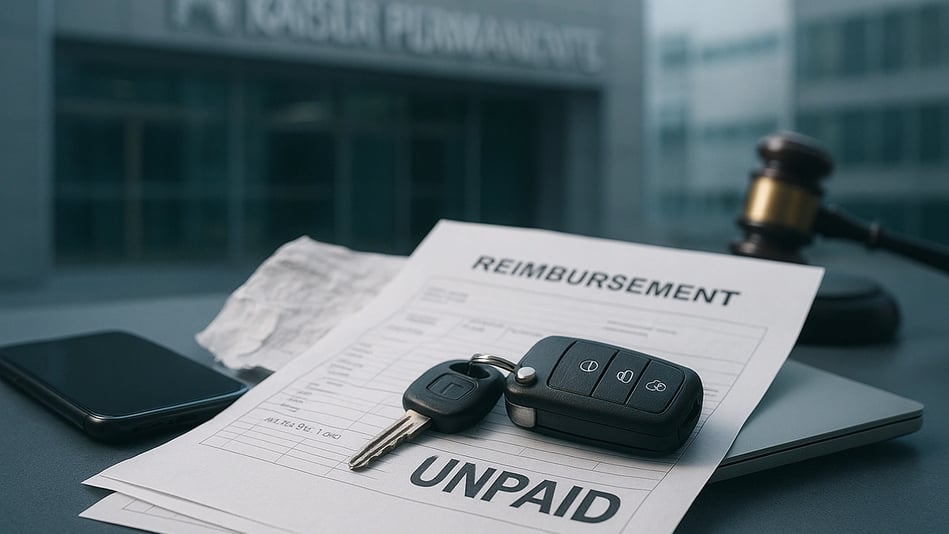$15M Settlement in Kaiser Expense Reimbursement Case

Table of Contents
Case Background
A group of employees brought a class action lawsuit against Southern California Permanente Medical Group, Inc., and Kaiser Permanente International. The lawsuit accused the healthcare organizations of widespread violations of California labor laws concerning basic employment expenses. The Plaintiffs represented not just themselves, but hundreds of other employees who faced similar circumstances.
Cause
The central cause of the complaint involved the Defendant companies’ alleged failure to reimburse business expenses under California Labor Code § 2802. The Plaintiffs asserted that their jobs required them to use personal equipment, like cell phones, computers, and vehicles for work-related tasks, but the companies had not fully repaid them for these necessary costs. This policy, the Plaintiffs argued, unfairly shifted the financial burden of business operations onto the employees.
Injury
The primary injury claimed by the Plaintiffs was financial hardship resulting from having to pay out-of-pocket for company business. This included unreimbursed expenses such as mileage for travel necessary for work duties and costs associated with maintaining a home office. The Plaintiffs stated that this systematic lack of reimbursement caused an ongoing, quantifiable financial loss to themselves and the entire class of affected employees.
Damages Sought
In their complaint, the Plaintiffs sought a wide range of monetary and non-monetary relief. They asked the Court to declare that the Defendants had violated Labor Code § 2802. Furthermore, they demanded reimbursement for all unreimbursed business-related expenses, including home office and mileage costs, accrued interest, and attorney’s fees. They also sought an order for restitution under California’s Unfair Competition Law, asserting the companies’ practices constituted unlawful and unfair business acts. The request included penalties under the Private Attorneys General Act (PAGA), a California law that allows employees to act as private attorneys general to recover civil penalties for labor code violations.
Key Arguments and Proceedings
The lawsuit, officially filed as a class action, represented all similarly situated employees whose business expenses had gone unreimbursed. The proceedings eventually moved toward a resolution outside of a trial, culminating in a judicially approved settlement.
Legal Representation
Plaintiff(s): Deborah Shaw | Denise Uribe | Sonia LeDoux | Daunte Jones | Susan Tinney | Daniele Blackwell | Tavaris McCoy.
· Counsel for Plaintiff(s): Mark D. Potter | James M. Treglio | Glugoski John James | Reuben D. Nathan | Righetti Matthew
Defendant(s): Southern California Permanente Medical Group, Inc. | Kaiser Permanente International.
· Counsel for Defendant(s): Christian J. Rowley | Kerry Friedrichs | Pamela L. Vartabedian
Key Arguments or Remarks by Counsel
The case proceeded through the initial filing and responsive pleading stages, with the defense denying the core claims before the parties entered settlement discussions.
Claims
The Plaintiffs’ legal teams advanced the argument that the Defendants had simply failed to adhere to the clear mandate of California Labor Code § 2802. This law requires an employer to indemnify, or repay, an employee for all expenses and losses that the employee incurred in the direct consequence of the discharge of his or her duties. Counsel argued that the company mandated the use of personal resources for work and knowingly benefited from this arrangement without providing full and timely reimbursement.
Defense
In their official Answer to the complaint, the defense counsel for Southern California Permanente Medical Group generally denied all allegations. The defense asserted that the company had a system in place to handle employee expenses. By denying the claims outright, the Defendant company set the stage for a full legal battle, although ultimately, the parties chose to resolve the matter through negotiation and a settlement agreement.
Class Action Settlement
Instead of proceeding to a jury trial where a verdict would have determined liability and damages, the parties reached a comprehensive Class Action Settlement. This agreement required Court approval to ensure it was fair and reasonable to the entire group of affected employees.
The Superior Court of California for the County of Los Angeles, with the Honorable Elaine Lu presiding, granted final approval of the class action settlement on November 12, 2025. This ruling confirmed that the negotiated agreement was fair, adequate, and reasonable for the class members. The Court also specifically addressed and overruled objections filed by three individual class members, Candice Diane Thompson, Roberta Tinajero, and Rai Warbasse, clearing the way for the settlement’s finalization.
The essential terms of the resolution established a substantial financial package for the Plaintiffs and the class:
Gross Settlement Amount (GSA): The Defendants agreed to pay a total of $15,000,000 as the Gross Settlement Amount. This entire amount was designated as non-reversionary, meaning any funds not distributed to class members would be disbursed according to the Court order, rather than returning to the Defendants.
Attorney Fees and Costs: The Court approved a significant portion of the settlement amount for the legal teams that had handled the case. Class Counsel received an award of $5,000,000 for attorney fees, representing one-third of the total GSA, plus an additional $74,627.98 to cover litigation costs.
Service Payments: The seven named Plaintiffs—Deborah Shaw, Denise Uribe, Sonia LeDoux, Daunte Jones, Susan Tinney, Daniele Blackwell, and Tavaris McCoy—each received a $5,000 service payment. This totaled $35,000 and served as compensation for their time and effort spent acting as class representatives during the litigation.
PAGA Penalty Distribution: As part of the resolution, a PAGA penalty of $500,000 was allocated. Seventy-five percent ($375,000) of this penalty went to the California Labor and Workforce Development Agency (LWDA), while the remaining twenty-five percent ($125,000) was distributed to the aggrieved employees who were part of the settlement.
The ruling formally concluded the case, obligating the Defendants to pay the settlement funds and payroll taxes associated with the GSA. In exchange, the Plaintiffs and the class members formally released the Defendants from the claims described in the lawsuit. The Court set future deadlines for the final report on the distribution of funds, setting a final end to the litigation.
Court documents are available upon request at jurimatic@exlitem.com
